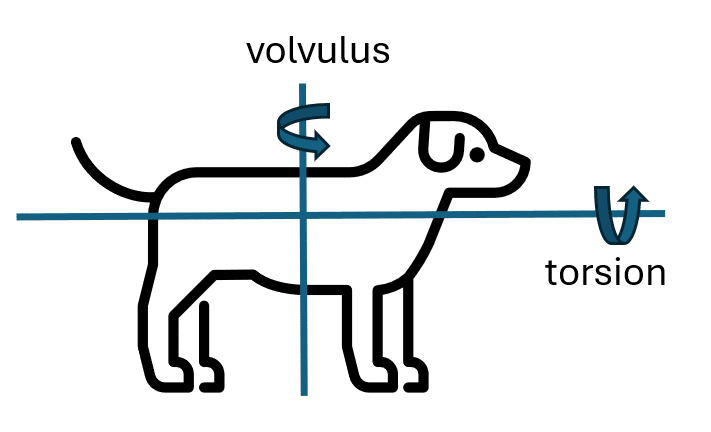Most people don’t realize it, but internal organs are not fixed in place and do have the ability to move around inside the body. When the movement of an internal organ involves a twist, the patient becomes critically ill because the twist cuts off blood supply to that organ. Internal organs can twist either on their long axis (torsion) or along their short axis (volvulus). The most common disorder caused by a twisted organ is bloat, or gastric dilation and volvulus. However, the veterinarians at the Schwarzman Animal Medical Center diagnose and treat a variety of twisted organs in dogs, cats and rabbits. I’ll discuss further in today’s blogpost.
Liver Lobe Torsion in Rabbits
Several organs are prone to torsion, including the spleen, colon and liver. Rabbits seem to be the species most associated with liver lobe torsions. Their symptoms include lack of appetite, decreased fecal output and lethargy, based on findings from a recent publication. However, these are common symptoms for sick rabbits, making the torsion diagnosis not immediately obvious. One clue to the diagnosis of liver lobe torsion is elevated liver tests on laboratory analysis; however, an abdominal ultrasound is required to make the final diagnosis. Surgical removal of the affected liver lobe provides the best outcome, according to the research.
Splenic Torsion in Dogs
Splenic torsion can accompany bloat, but it can also occur without a twisted stomach. Splenic torsion most commonly occurs in dogs. Like rabbits with liver lobe torsions, the clinical signs are vague, making diagnosis a challenge. Enlarged spleens can be felt through the skin on examination (“palpated”) in most dogs with splenic torsions. Surgical removal, followed by a short hospital stay, resulted in over 90 percent of dogs recovering completely. German shepherds, Great Danes and English bulldogs may be predisposed to developing splenic torsion. AMC surgeons recently saved the life of one of New York’s Finest, a police dog who collapsed in our waiting room because of splenic torsion.
An Emergency Colonic Torsion in a Labrador
AMC specialists in surgery and emergency and critical care recently saved the life of a four-year-old Labrador with colonic torsion. The owners knew something was wrong because she was unable to defecate. X-rays taken in the ER accompany this blogpost and you can see air bubbles throughout the intestine indicating a blockage. A special dye was infused into the colon to confirm the diagnosis of colonic torsion. AMC surgeons untwisted the colon and tacked it back into place. The lucky lab went home just a couple days later. This big save by the AMC team was an extra special one as she was one of the first major cases to undergo surgery in the recently opened Denise and Michael Kellen Institute for Surgical Care.
Lung Lobe Torsion
While this blogpost has focused on abdominal organs that develop volvulus and torsion, lung lobes can also twist. Read a prior blogpost to learn more.

